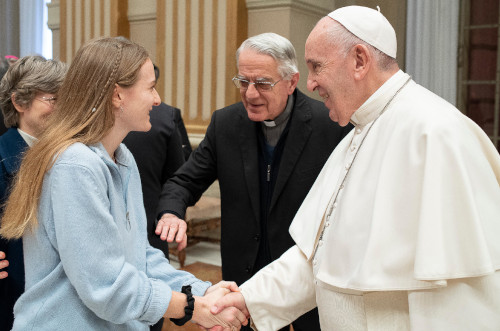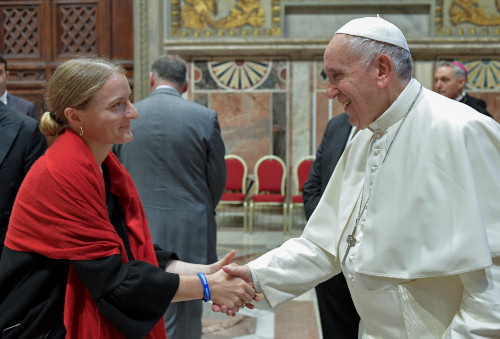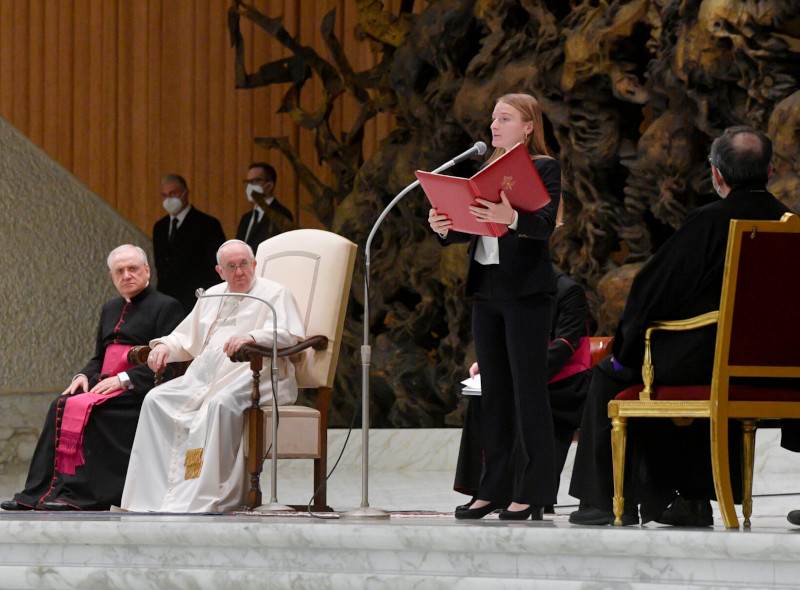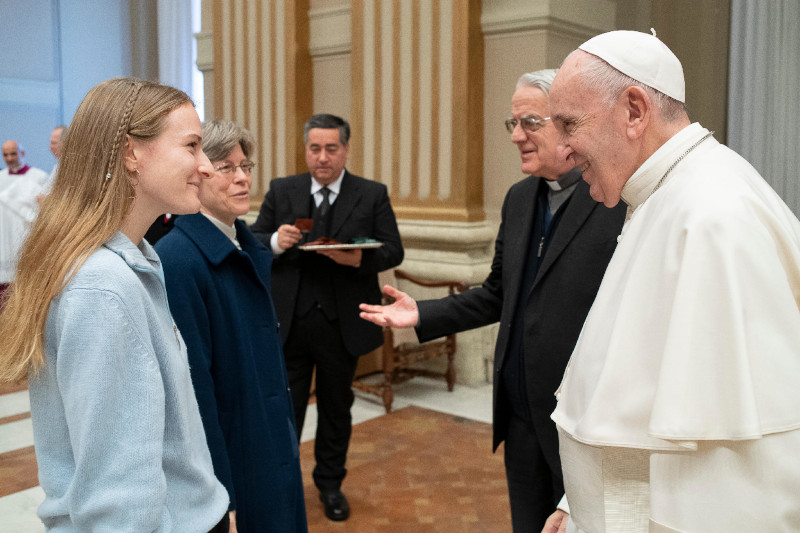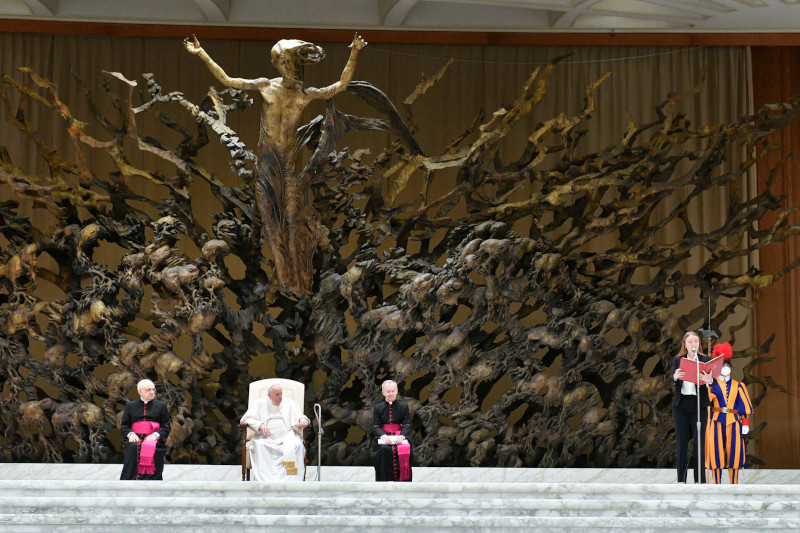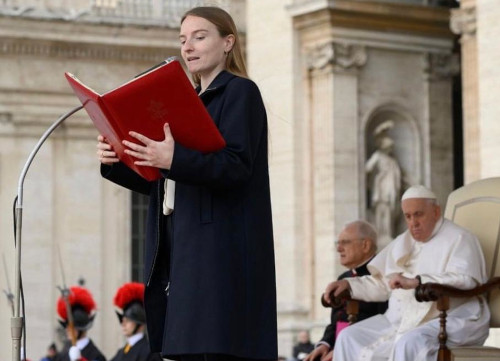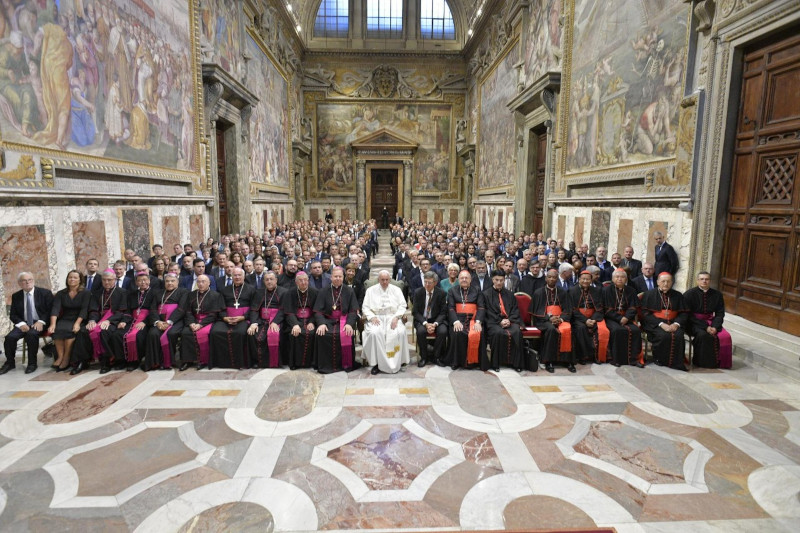|
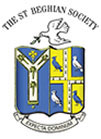 |
The Old St Beghian | |
| July 2023 | |||
A letter from an OSB in Rome: from Francesca Merlo (L 11-15).
“As mine was the last year to finish school before its closing in 2015 I think it’s safe to say that I’m amongst the youngest of all of you reading. That’s already a lot of pressure to be under, but to know that what you are reading is not only by me but also about me is the next most difficult part. To those of you whom I haven’t met, my name is Francesca Merlo, and I’m a 27 year old British/Italian journalist and translator, currently working for the Vatican.
I think the best way to start is with the only thing I know we have in common for sure, and that is, of course – in whatever form – St Bees School.I joined St Bees in the 4th form. It was 2011. I had lived the first fourteen years of my life in Paris, and after one year of my family and I living in Rome, we decided that boarding school might be a good idea for me. Boarding school isn’t such a big thing in Italy and people always ask me about it in awe. I tell them, now, that they were the best four years of my life. And it’s true.
What a wonderful place to be a troubled teenager!
I did get into some trouble when I first started, nothing particularly exciting so I won’t go into too much detail about it. I’ll talk instead about a time I didn’t get into trouble, when the men doing work outside Bega, my house, found cigarette butts on the floor. I thought I was doomed, mainly because the cigarettes I’d been throwing from the roof of Bega House were Camel, and (much to my dismay) you couldn’t buy Camel cigarettes in England, and I was sure they would trace them back to the only Italian girl on the house. Luckily my housemistress at the time didn’t know much about British cigarette brands and she dropped the charges for lack of evidence!
By sixth form I’d become an exemplary student. I didn’t study particularly hard, but I was well behaved and got along with all the staff and pupils. I spent most of my time in the music department with Mrs Simper, who guided me through my grade 8 singing, encouraged me to apply to sing with the National Youth Choirs of Great Britain, and prepared me for my singing Diploma, which I eventually passed. I wasn’t the best at sports, but I was captain of our newly formed rugby team, led by Mr McNee, whom I had the pleasure to see in Rome recently when he came with his son, and my friend, Fraser to watch Scotland beat Italy. I also played hockey and was dubbed ‘feisty forward’ by the 1st XI hockey team and by the McNernerys, who had hoodies printed for us with our nicknames on the backs when the school said they couldn’t afford them. Ellie McNerney is another dear friend and lived with me on Bega - if the Bulletin ever opened a column on stories about friends, I would have many to tell about her. Her parents also got me out of trouble a few times. The one I owe them for the most was when Lydia, who boarded with us on weekdays, and I called them and asked them if we could go and sleep at theirs instead of going back to house because we’d drunk far too much fireball whisky watching the Italy rugby match in the Carlisle Wetherspoons! They said yes, of course, and covered for us and looked after us as parents do. After these cigarette and whisky stories, I must promise you that I’ve become neither an alcoholic nor a chain-smoker, though I do enjoy a whisky every so often (not fireball, which Denis, the American exchange student had so excitedly brought us that day in ‘Spoons).
It was Red Nose Day when the terrible announcement came. It had to happen on the one day of the year we all came in dressed as our favourite television characters. Mrs Malan, who was head of boarding at the time, came down the corridor outside the salad room saying ‘prefects, gather everyone into the sports hall.’ We didn’t ask any questions, she’d barely looked us in the eyes, it clearly wasn’t a good time. So, we did as we were told and went around the school shepherding everyone into the sports hall, where we sat, cross-legged, with no teacher in sight and waited. Spiderman speculated someone had died; Pippi Longstocking brought it down a notch and said someone was probably ill. Lydia, who was just Lydia to me under her ridiculous 118 costume, turned to me and said ‘whatever it is, it’s serious.’ It became serious to me, too after that. It was when Mr Davies walked in, gown flying behind him, that I looked at Lyd and with I don’t know what arrogance told her ‘the school’s closing.’ We’d been hushed into silence by then, but she looked at me and mouthed ‘No, I think he’s ill’, shaking her head. Then we all looked up, in unison, to the man who knew everything.
‘St Bees School is officially closed.’ I think that’s all anyone heard.
You all know what happened next. The campaign, the letters, the videos – all useless. The school closed and we all went our separate ways.I went to Warwick to read French, Spanish and Arabic but dropped out after a year and a half and went back to Rome, where my parents were still living at the time. I had enrolled in a university there for translators and interpreters, but I really just didn’t want to be at university. That was my first mid-life crisis! Then one day, like every other, when I was supposed to be in class at university I saw a notice, “ufficio placement/stage” (internship office) and from then, everything changed. It took a couple of months to get the paperwork sorted and in June I started my internship at the British Embassy to the Holy See. I barely even knew what the Vatican was back then, let alone the Holy See. Towards the end of my three-month internship, my wonderful colleague encouraged me to apply for a job as a journalist at Vatican News/Vatican Radio and five years later I am still there. (No, I never did get my degree.)
It’s perhaps worth noting that working for the church was the furthest thing away from anything I had ever imagined, and the Rev. Swartz, with whom I had a great relationship throughout my time at school, would only be even more convinced of the existence of God if he knew what I was up to now! I got a G in my GCSE religious studies, and if you don’t think that grade exists, Mr Swartz would be able to confirm it! So it would seem that I was destined, in one form or another to this church-related life. Don’t believe for a second, though, that those who work as journalists in the Vatican will ever become nuns or priests. Many of us are lay people and all of us tell the news in the same way that other journalists do around the world. The job, however, is quite different.
One of my favourite parts of the work is the reading, both on the radio during the live news broadcast we conduct daily, but also at papal events. I have the honour of providing the English-language translation at Pope Francis’ Wednesday General Audiences in St Peter’s Square. This is done in eight different languages. I also provide the commentary for any live radio and television broadcasts of his events. This means that anything the Pope does that is televised has mine or one of my colleague’s voices explaining what is going on and translating what he says for the anglophone world.
We do the same kind of translations in writing. Each papal discourse is translated into English and synthesised into an article for our web page. Each article is then tightened and adjusted to be read for the radio, and then, recorded and used on our broadcast. When I first arrived, I struggled with the theological side of the translations. Most of what I knew about the liturgy and Biblical passages came from my years singing. You’d be surprised at how many Bible passages I knew off by heart, without knowing their provenance or real meaning. I am no expert now, by any means, but everything does make much more sense when I read and translate it, even the somewhat complicated ‘Vaticanese’ that some of the cardinals speak.
the Holy Father's Urbi et Orbi blessing (around 2019)
But we don’t only speak about the Pope at Vatican News. The order of our work is Pope, Vatican, Church and World. I am lucky to work in a varied team, with colleagues from all over the Anglophone world, in which we each have our areas of expertise and interest. My interests (as I doubt I will ever become an expert in anything) lean more towards the humanitarian side of the church’s work. I am lucky enough to have interviewed many interesting people in the humanitarian field, from water distribution to migration and from conflict resolution to human trafficking, to name but some. Some of these have been over the phone, others via Zoom, and many in person as people come to the Vatican to meet with Pope Francis, or to Rome for work. At times, I too, have gone to them. My job, in fact, also allows me to travel.
The first journey I went on was in my very first year working here at the Vatican. I travelled to Panama where Pope Francis was attending World Youth Day – an event that happens every four years and gathers young Catholics from all over the world. I must say it was a great first journey.
The next World Youth Day is actually taking place this year, having been postponed for a year due to the Covid-19 pandemic, and I will be going to Portugal at the beginning of August to cover it. Covid stopped a lot of the travelling, as you know, but I have also been to Dubai for an interreligious meeting, to Paris for a conference on women in leadership at the UNESCO headquarters and to various places within Italy.
Vatican Radio offers its services in 48 different languages and so I work in a building with people from over 60 different countries.
It’s an interesting place and we all work together, for ourselves but also for one another. Anyone who interviews anyone does so in all the languages that person speaks, especially when you are sent on journeys.
I also run the Vatican News Instagram account, rapidly approaching its first million followers. (Follow us!) There is a lot to say about working in the Vatican, but I know that I have already totally gone over the requested length for this article. Pope Francis himself has stressed that a homily should be no longer that ten minutes, I think that can be applied to anything.
(around 2019 or 2020) - Francesca is in the third or fourth row on the left
I’d like to conclude with a memory of my first meeting with Pope Francis, or Papa Francesco. I have grown extremely fond of him over the years. Impossible not to when you follow his every word and every movement, so much so that you begin to think you can recognise his mood or how he is feeling from the way he walks and the way he talks. But no matter how much you think you know him it is always exciting when you see him approaching you to shake your hand. You see this white mystical figure coming towards you and he humanises himself, going off route and making the Gendarmes (Vatican Police) and Swiss Guards (Pope’s private guards) around him panic, just to say good morning to you, knowing you are working for him, to give you his hand, to smile at you. The first time, I shook his hand with both my hands and I really didn’t know what to say: ‘Nice to meet you. I’m Francesca.’ ‘Nice to meet you, too. I’m Francesco’, was the reply.”
Home
The St Beghian Society
St Bees School,
St Bees, Cumbria, CA27 0DS.
Tel: (01946) 828093 Email: osb@stbeesschool.co.uk
Web: www.st-beghian-society.co.uk
![]()
